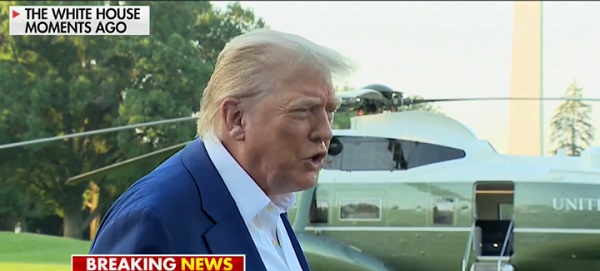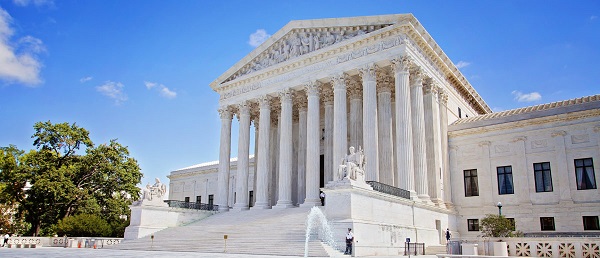Daily Caller
‘He’s Willing To Hit Them Hard’: American Adversaries Pull Out The Stops To Derail Trump’s White House Bid

From the Daily Caller News Foundation
By Jake Smith
Former President Donald Trump dealt with some American adversaries harshly during his first term, threatening them with military action and choking their economies. Now that Trump is on the verge of being reelected, those adversaries are panicking — and trying to prevent Trump from entering the White House.
Trump is in a dead-heat race against Vice President Kamala Harris in next Tuesday’s presidential elections. Nations making up the so-called “Axis of Evil” — especially Iran and China — have made it clear they do not want Trump to win. That’s borne in part out of anger against Trump for his actions during his first term and fear of what he will do in his second, according to a review of multiple reports.
It’s an open secret that Iran and China have attempted to interfere in elections in the past, as they are this year. Both countries have utilized a variety of methods to interfere with Trump’s bid for the White House. That’s particularly true for Iran, which has attempted to kill Trump and waged cyberwarfare operations against his campaign.
“While the Islamic Republic continues to mean what it says when it calls for ‘death to America,’ there is only one current presidential contender whom the regime and its terrorist network are trying to kill. That is Donald Trump,” Behnam Ben Taleblu, a scholar on Iranian affairs at the Foundation for Defense of Democracies, told the Daily Caller News Foundation. “That is born of a clear understanding in the regime’s mind that he is the candidate of real pressure.”
Trump’s approach to Iran — the largest state sponsor of terrorism and an accomplice in the killing of scores of U.S. troops over recent years — was described by his administration as a “maximum pressure” campaign. Trump withdrew from the Obama-era Iran nuclear deal in 2018, arguing that it allowed Tehran to rake in billions of dollars under eased sanctions while failing to prevent it from building a nuclear weapon. He replaced the deal with harsh sanctions that cut off many of the country’s revenue streams.
“Trump demonstrated he’s willing to hit them hard. This isn’t the same approach we’re seeing from the current administration, which is why Iran’s focus remains on Trump,” former senior Pentagon official and Strauss Center fellow Simone Ledeen told the DCNF.
Iran’s network of terrorist groups suffered from a lack of funding as a result of Trump’s approach, but remained incredibly hostile to the U.S., launching multiple attacks on American forces in the Middle East in the following year. As attacks escalated, Trump made the decision to launch a drone strike and assassinate top Iranian general Qasem Soleimani while he was visiting Iraq in 2020.
Soleimani was a pivotal figure in the Iranian military, and his death greatly angered Tehran.
“The Soleimani strike… exposed some of Iran’s vulnerabilities,” Ledeen told the DCNF.
Iran has since staged multiple unsuccessful assassination attempts against Trump through various actors. The reports on the matter have seemed to escalate in recent months as the election draws close; U.S. intelligence officials briefed the Trump campaign in September on a previous assassination operation, which failed.
Iran has also carried out various cyberwarfare campaigns against Trump ahead of the election, some of which have been successful. Iranian-backed hackers gained access to internal Trump campaign documents — specifically regarding research about Republican vice presidential candidate J.D. Vance — and leaked it to various media outlets and reporters in August and September, only some of whom published the material.
Iranian hackers also accessed and leaked a number of internal Trump campaign emails, which made their way into public reporting. The U.S. charged three Iranian operatives for the action in late September.
“If Trump is back, I’d expect Iran to ramp up its threats,” Ledeen told the DCNF. “Another Trump term would bring renewed pressure, and Iran’s leaders know that. They’ll likely grow more desperate and aggressive as they try to hold onto control in the region, but they’re not in the position they once were.”
If Trump wins, he’ll need to be ready to face down Tehran a second time — while making it clear his contention is not with the Iranian people, who have suffered under the authoritarian Islamic regime, Taleblu told the DCNF.
“While one of the strengths of former President Trump was his ability to keep the adversary guessing, I think it’s quite clear at a minimum a future Trump administration would return to a policy of maximum pressure, and begin to put meaningful and sustained pressure on oil and petrochemical exports and financial flows,” Taleblu told the DCNF.
“What a prospective Trump administration will need to be prepared for is how Tehran might be inclined to respond to pressure with pressure of its own,” Taleblu said. “And that’s why to offset escalation by the regime, as well as to do the moral and politically astute thing, Trump will need to pair maximum pressure against the regime with a real policy of maximum support for the Iranian people.”
The Trump campaign told the DCNF that Iran is “terrified” of a second Trump presidency.
“The terror regime in Iran loves the weakness and stupidity of Kamala Harris,” spokesman Steven Cheung said.
China has also been incredibly wary of a second Trump term, according to multiple reports. Chinese officials are reportedly fearful of Trump because he appears more unpredictable than Harris.
Publicly, Beijing refuses to say who it would rather deal with. But privately, officials were previously hoping that President Joe Biden would beat out Trump in the elections because they felt Biden was less of a threat, according to officials who spoke to The Wall Street Journal earlier in October .
When Biden dropped out of the race in July, officials shifted their preference to Harris, even though neither candidate is likely that favorable to Beijing, according to the WSJ. China has expressed ire to Republican and Democratic administrations over the years and has launched cyberattack operations against both parties.
But Trump’s strict policies in particular caused headaches for officials, and they may be expecting similar policies if he wins again.
“They know a lot about what Donald Trump’s approach to government, diplomacy, trade negotiations might be, and they know a lot about what he said through the entirety of the campaign,” Steve Yates, senior fellow at the America First Policy Institute, told the DCNF. “That is a challenge to them.”
Part of the fear among Chinese officials is that Trump will launch a second trade war if reelected. During his first term, Trump imposed heavy tariffs on China, significantly raising the tax on some incoming Chinese imports and deterring Americans from buying Chinese-made goods. Trump’s goal was to balance out the U.S.-China trade relationship and compel China to buy more American goods.
Trump has already publicly mused the idea of imposing 60% tariffs on Chinese goods if he wins back the White House, something Beijing is eager to avoid.
U.S. officials have said they’ve seen evidence of China trying to interfere in this year’s elections. It was reported last week that Chinese-backed hackers targeted data on Trump’s and Vance’s phones. It wasn’t clear what, if any, information was stolen, but it could be beneficial to Beijing if anything was taken. Members of Harris’ staff were also reportedly targeted.
A spokesperson from the Chinese Embassy in the U.S. claimed that Beijing was unaware of the hacking operation.
“We cannot comment [on] it… China firmly opposes and combats cyber attacks and cyber theft in all forms,” the spokesperson said. “We hope that the U.S. side will not make accusations against China in the election.”
A number of “bot” social media accounts linked to China have also been targeting Republican congressional candidates, according to a report released last week by Microsoft’s Threat Analysis Center.
“While not always resulting in high levels of engagement, these efforts demonstrate China’s sustained attempts [to] influence U.S. politics across the board,” Clint Watts, general manager of the tech company’s agency, wrote in a post regarding the report.
conflict
‘They Don’t Know What The F*ck They’re Doing’: Trump Unloads On Iran, Israel


From the Daily Caller News Foundation
President Donald Trump expressed frustration Tuesday after Iran broke a ceasefire, prompting retaliation from Israel during a gaggle with reporters on the White House lawn.
Trump announced the ceasefire Monday, saying it was supposed to take effect at 1 a.m. Eastern Daylight Time, but Iran fired missiles at Israel Tuesday. Trump vented, saying the countries had been “fighting so long” they couldn’t make peace.
WATCH:
“You know, when I say okay, now you have 12 hours, you don’t go out in the first hour just drop everything you have on them,” Trump said. “So I’m not happy with them. I’m not happy with Iran either. But I’m really unhappy if Israel is going out this morning because the one rocket that didn’t land, that was shot, perhaps by mistake, that didn’t land, I’m not happy about that.”
“We basically have two countries that have been fighting so long and so hard, that they don’t know what the fuck they are doing,” Trump added.
The United States struck facilities in Fordow, Natanz and Isfahan related to Iran’s effort to develop nuclear weapons early Sunday morning local time, using as many as 14 GBU-57 Massive Ordnance Penetrators in the operation, which involved a 37-hour flight by seven B-2A Spirit bombers.
The American strikes came ten days after Israel launched a military operation targeting the Iranian nuclear program. Iran has responded with repeated missile attacks on Israeli cities and a refusal to resume negotiations over its efforts to pursue nuclear weapons.
Automotive
Supreme Court Delivers Blow To California EV Mandates


From the Daily Caller News Foundation
“The Supreme Court put to rest any question about whether fuel manufacturers have a right to challenge unlawful electric vehicle mandates”
The Supreme Court sided Friday with oil companies seeking to challenge California’s electric vehicle regulations.
In a 7-2 ruling, the court allowed energy producers to continue their lawsuit challenging the Environmental Protection Agency’s decision to approve California regulations that require manufacturing more electric vehicles.
“The government generally may not target a business or industry through stringent and allegedly unlawful regulation, and then evade the resulting lawsuits by claiming that the targets of its regulation should be locked out of court as unaffected bystanders,” Justice Brett Kavanaugh wrote in the majority opinion. “In light of this Court’s precedents and the evidence before the Court of Appeals, the fuel producers established Article III standing to challenge EPA’s approval of the California regulations.”
Kavanaugh noted that “EPA has repeatedly altered its legal position on whether the Clean Air Act authorizes California regulations targeting greenhouse-gas emissions from new motor vehicles” between Presidential administrations.
“This case involves California’s 2012 request for EPA approval of new California regulations,” he wrote. “As relevant here, those regulations generally require automakers (i) to limit average greenhouse-gas emissions across their fleets of new motor vehicles sold in the State and (ii) to manufacture a certain percentage of electric vehicles as part of their vehicle fleets.”
The D.C. Circuit Court of Appeals previously rejected the challenge, finding the producers lacked standing to sue.
“The Supreme Court put to rest any question about whether fuel manufacturers have a right to challenge unlawful electric vehicle mandates,” American Fuel & Petrochemical Manufacturers (AFPM) President and CEO Chet Thompson said in a statement.
“California’s EV mandates are unlawful and bad for our country,” he said. “Congress did not give California special authority to regulate greenhouse gases, mandate electric vehicles or ban new gas car sales—all of which the state has attempted to do through its intentional misreading of statute.”
-

 Alberta23 hours ago
Alberta23 hours agoAlberta judge sides with LGBT activists, allows ‘gender transitions’ for kids to continue
-

 Alberta1 day ago
Alberta1 day agoAlberta Independence Seekers Take First Step: Citizen Initiative Application Approved, Notice of Initiative Petition Issued
-

 Crime13 hours ago
Crime13 hours agoNational Health Care Fraud Takedown Results in 324 Defendants Charged in Connection with Over $14.6 Billion in Alleged Fraud
-

 Health12 hours ago
Health12 hours agoRFK Jr. Unloads Disturbing Vaccine Secrets on Tucker—And Surprises Everyone on Trump
-

 Bruce Dowbiggin1 day ago
Bruce Dowbiggin1 day agoThe Game That Let Canadians Forgive The Liberals — Again
-

 Business1 hour ago
Business1 hour agoElon Musk slams Trump’s ‘Big Beautiful Bill,’ calls for new political party
-

 Censorship Industrial Complex51 mins ago
Censorship Industrial Complex51 mins agoGlobal media alliance colluded with foreign nations to crush free speech in America: House report
-

 Business1 day ago
Business1 day agoCanada Caves: Carney ditches digital services tax after criticism from Trump






